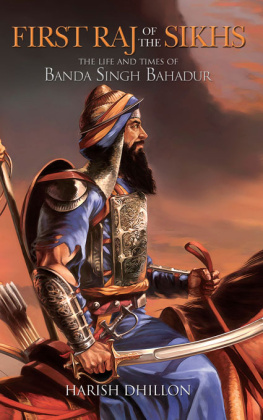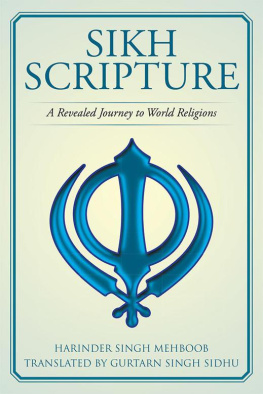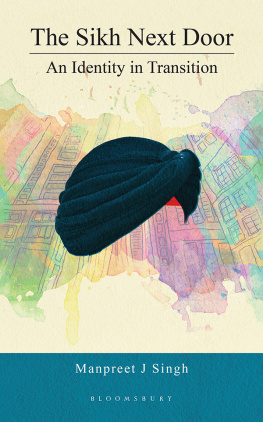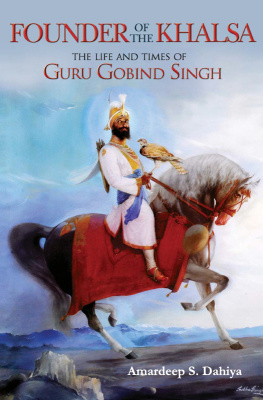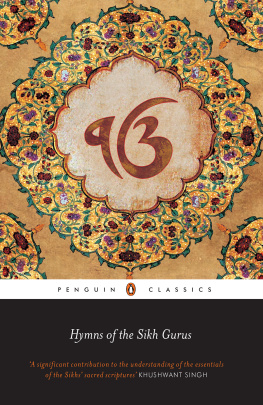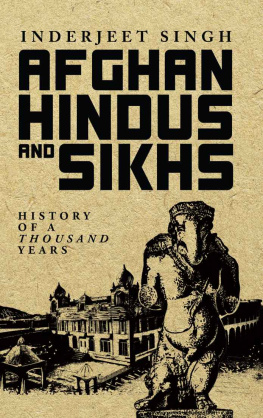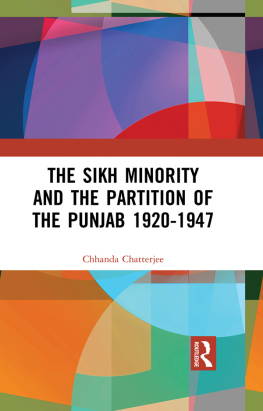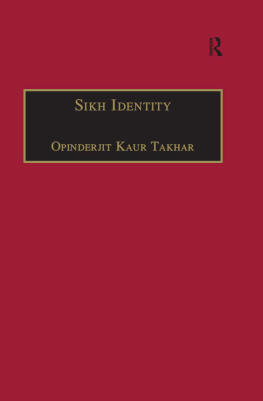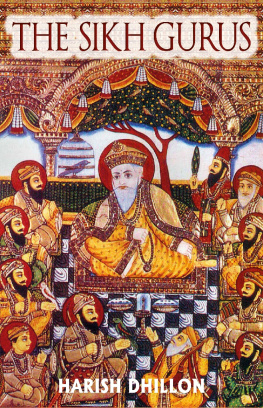

Other titles by the same author
The Wayside Tree a novel
The Lives and Teachings of the Sikh Gurus
Love Stories of Punjab
After the Storm short stories
The Living Saint
The Song of Silence
Nanak
More than Everest
Shaheed Bhagat Singh
Lala Lajpat Rai The Unsung Hero

Hay House Publishers (India) Pvt. Ltd.
Muskaan Complex, Plot No.3, B-2 Vasant Kunj, New Delhi-110 070, India
Hay House Inc., PO Box 5100, Carlsbad, CA 92018-5100, USA
Hay House UK, Ltd., Astley House, 33 Notting Hill Gate, London W11 3JQ, UK
Hay House Australia Pty Ltd., 18/36 Ralph St., Alexandria NSW 2015, Australia
Hay House SA (Pty) Ltd., PO Box 990, Witkoppen 2068, South Africa
Hay House Publishing, Ltd., 17/F, One Hysan Ave., Causeway Bay, Hong Kong
Raincoast, 9050 Shaughnessy St., Vancouver, BC V6P 6E5, Canada
Email: contact@hayhouse.co.in
www.hayhouse.co.in
Copyright Harish Dhillon 2013
Cover artwork: Kanwar Singh Dhillon
Photographs: Malkiat Singh
The Banda Bahadur Coin: Saran Singh
The Shah Alam Bahadur Coin: Jyoti M. Rai
The moral right of the author has been asserted.
The views and opinions expressed in this book are the authors
own and the facts are as reported by him, which have been verified
to the extent possible, and the publishers are not in any way
liable for the same.
All rights reserved. No part of this book may be reproduced by any
mechanical, photographic, or electronic process, or in the form of a
phonographic recording; nor may it be stored in a retrieval system,
transmitted or otherwise be copied for public or private use other
than for fair use as brief quotations embodied in articles and
reviews, without prior written permission of the publisher.
This is a completely updated and revised edition of
The Legend of Banda Bahadur, published in 2004.
ISBN 978-93-81431-89-4
Designed and typeset at
Hay House India
Printed and bound at
Thomson Press (India) Ltd., Faridabad, Haryana (India)
To
my granddaughter, Mannat,
who reflects, to a remarkable extent,
Banda Bahadurs indomitable courage and
invincible spirit even when faced with
powerful and ruthless adversaries.
BANDA BIR
(THE VALIANT PRISONER)
by Rabindranath Tagore
The Nobel Laurete Rabindranath Tagore gave a befitting tribute to Banda Singh Bahadur in his much celebrated poem Bandi Bir (The Valiant Prisoner) by outlining the heroic Sikh rebellion and resistance of Mughal atrocities. Extracts of the first and last parts of this phenomenal poem (in Bengali, written phonetically here):
Pancha nadir tirey
Beni pakaiya shirey
Dekhite dekhite Gurur mantre
Jagiya uthhechhe Sikh
Nirmam, nirbhik.
Hajar konthe Gurujir Joy
Dhoniya tulechhey dik
Nutan jagiya Sikh
Nutan ushaar Surjer paane
Chahilo nirnimikh.
.
Sabha holo nistabdha
Bandar deho chhinrilo ghaatak
Shanraashi koriya dagdha
Sthir hoye Bir morilo
Na kori ekti katar shabda.
Darshak-jan mudilo nayan
Sabha holo nistabdha.
(A N APPROXIMATE TRANSLATION )
The Mughals and Sikhs together kicked up
the dust of Delhi thoroughfares;
Who will offer his life first?
There was a rush to settle this;
In the morning hundreds of heroes
offered heads to the executioner,
calling Glory be to Guruji;
The Kazi put into Bandas lap one of his sons;
Said must kill him with own hands;
Without hesitation, saying nothing,
slowly Banda pulled the child on his breast;
Then slowly drawing the knife from the belt, looking at the boys face, whispered
Glory be to Guruji, in the boys ears.
The young face beamed;
The court room shook as the boy sang,
Glory be to Guruji;
Banda then threw the left arm around his neck
and with the right plunged the knife into the boys breast;
The boy dropped on the ground,
smiling, saying Glory be to Guruji.
The court was dead silent.
The executioner tore apart Bandas body
with a pair of red-hot tongs;
Standing still the hero died,
not uttering a sound of agony;
The audience closed their eyes;
The court was dead silent.
(Source: Wikipedia)

C ONTENTS

If Bahadur Shah had not quitted the Deccan, which he did in a.d. 1710, and marched towards Punjab with all his imperial forces, there is every reason to think the whole of Hindustan would have been subdued by these invaders (Sikhs).
Lt. Col. M. Malcolm

T HE FASCINATING, COLOURFUL AND LARGER THAN LIFE personality of Banda Singh Bahadur has spewed dozens of books some well researched, some indifferent. They bring us details of his remarkable career and seek, with varying success to explain his enigmatic persona. Here was a man who had lived life in reverse. He had become an ascetic when he was in his teens and had perforce to return to the material world in his later years; a man who turned from a scholar of Hindu religious and spiritual texts into a great warrior and a remarkably efficient leader. According to Harinder Singh, co-founder of the Sikh Research Institute, Texas: His [Bandas] was a life defined by two extreme identities by the age of 38 when he met Guru Gobind Singh. Before that fateful meeting, his allegiance had been to Vaishnavite and Shavite traditions. He was a natural fighter and hunter and had studied religious texts, spirituality, and Tantra. He attempted an ardous and punishing journey of some 2,500 kilometres, with no training, no weapons, no army. Yet, in 20 months, Banda Singh Bahadur captured Sirhind and established the Khalsa Raj. His deeds were that of a mortal, legendary accomplishments not rhetorical or magical. He prepared the coming generations of Sikhs for future conflicts: Sikhs warring with Afghans, Persians and the Mughal empire.
And yet, he remains a distant figure in history. This book seeks to present Banda Singh Bahadur as a flesh and blood character, a character, who, it is hoped, will stay with the reader long after he has finished reading the book.
I knew I could not hope to achieve this if I adopted the guise of a historian. My style would be precise, clear and crisp and my depiction of Banda Singh Bahadur would be accurate and historically correct. But there would be no flesh and blood, no life, no passion, no pain. My Banda had to be pictured as a living, breathing man and for this I would have to take on the role of a narrator, telling a story with all the trappings that go with it. Hence, I have used real life incidents while creating others to support the bald statements of the history books. Periods of Bandas life on which the history books are silent or where both legend and accounts have offered what is plainly implausible, I have taken liberties with, for which I offer no apologies.
Next page
